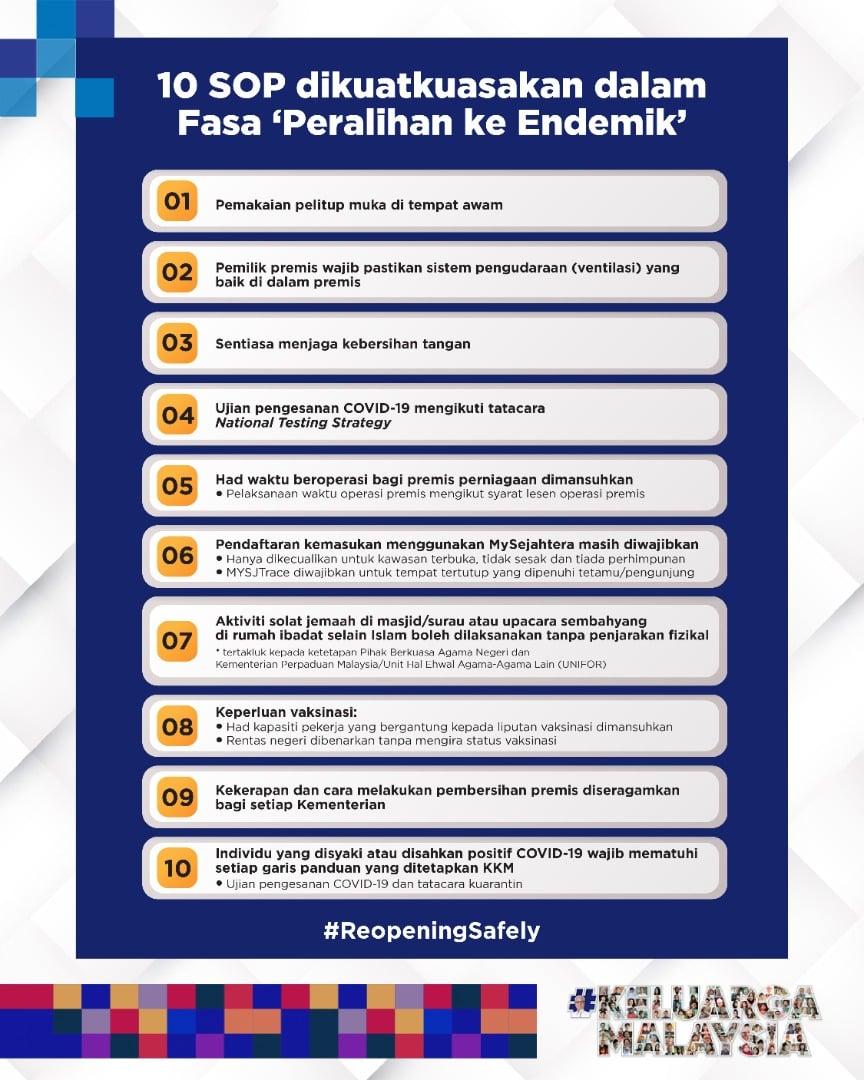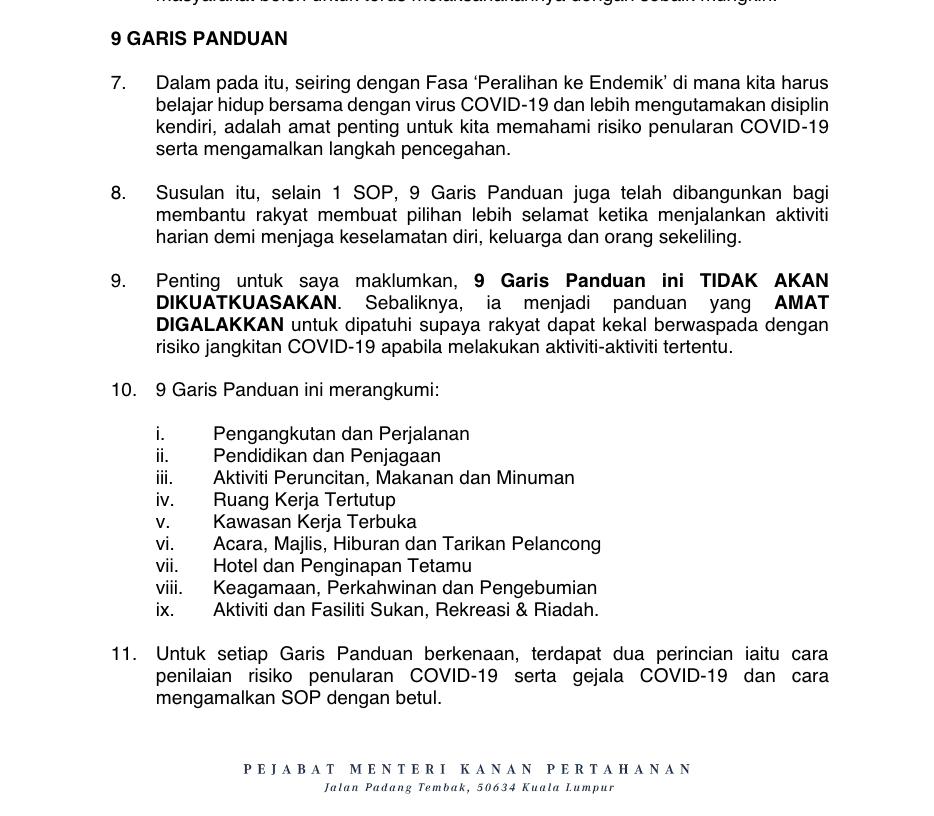share on
Here are all the SOPs for those in Malaysia to follow come 1 April 2022, around inter-state travel, operating time limits for businesses, religious activities, and more.
Starting 1 April 2022 (Friday), Malaysia will enter the endemic phase with Senior Minister of Defense Hishammuddin Hussein; Minister of Health Khairy Jamaluddin; Minister of Finance Tengku Zafrul, and Minister of Communications & Multimedia Annuar Musa spearheading the efforts. This was announced by Prime Minister Ismail Sabri on 8 March 2022 (Tuesday).
PM Ismail shared that although in recent weeks, the number of daily COVID-19 cases increased sharply due to the Omicron variant, the number of patients who are categorised as level three, four, and five - which are those who require urgent medical support - are very low at 0.7%. As well, the number of patients who need to be treated, and monitored at the intensive care unit (ICU) are also "under control at 42% utilisation rate".
He added that most Malaysians are completely vaccinated, and have also received a booster dose. "Until 7 March 2022, the complete vaccination rates for the adult population in the country is 98.7%; while the booster dose vaccination rate for the adult population is 64%," PM Ismail shared. That is why, after "taking into account various factors, doing a risk assessment, and discussing with the quartet of Ministers", the Prime Minister decided that the nation will move ahead with the endemic phase.
With that, as part of the endemic strategy, otherwise known as #ReopeningSafely, or Peralihan Ke Endemik, Malaysia will refine its standard operating procedures (SOPs) for all phases, and reopen its borders for international travel.
For the benefit of HRO readers, in this story we focus on the former, i.e. understanding the SOPs for Malaysia's endemic phase.
Starting 1 April 2022 (Friday), residents of Malaysia are to follow the SOPs listed below:
- Continue wearing face masks in public places, and not gather in a crowd.
- The owner of any premises must ensure a good ventilation system.
- Always maintain hand hygiene.
- Follow the National COVID-19 Testing Strategy guidebook released by the MOH, which covers testing requirements for specific activities, such as at the workplace, for mass gathering, inbound travellers, and more. [Download the guide here]
- The operating hours' time limit for business premises is abolished: Premises are now allowed to operate at the time specified in accordance with the terms of their operating license issued.
- Continue using the MySejahtera app to enter into enclosed premises (i.e. shopping malls). The app is only not mandatory for open areas (i.e. parks).
- Continue using the MYSJTrace function in enclosed premises filled with guests and visitors (i.e. homes).
- Allowed to engage in interstate travel regardless of their vaccination status.
- Allowed to organise congregational prayer activities at the mosque/surau, or ceremony prayers in all houses of worship without social distancing measures, as long as they are subject to the rulings of the respective state & religious authorities (detailed below).
- Vaccination requirements for the workplace: Office capacity limits previously put in place based on employees' vaccination status are being dropped.
- COVID-19 protocols that will continue:
- The frequency and method of cleaning the premises is standardised by each Ministry
- Individuals who are suspected or confirmed positive for COVID-19 must comply with all guidelines set by MOH (listed in step #4 above),
- COVID-19 detection test and quarantine procedures remain in place.
Those who are interested in the SOPs (in Malay) can first find it in a checklist format in the illustration below:

With regard to religious activities, PM Ismail reminded that the implementation, and the final SOP for the mosque/surau is "subject to the ruling State Religious Authorities and for Houses of Worship", and for Islam is "subject to the Ministry of Unity Malaysia, and the Unit Affairs of Other Religions (UNIFOR)".
As listed in the SOPs above, employers can take note that employee capacity limits at the workplace, which were previously determined according to the number of vaccinated employees, will be abolished.
On top of that, for any social activity that would involve a group of people gathering, PM Ismail added that the "50% capacity limit" rule will be abolished - although he reminded citizens of the nation to abide by social distancing measures. In an event when individuals test COVID-19 positive, or are close contact, they are to comply with all guidelines (i.e. tests, and quarantine procedures) set by the Ministry of Health (MOH).

Minister Hishammuddin also released a separate statement (attached above) about the endemic phase, which Malaysians can take note that apart from the aforementioned SOPs, there will be clear guidelines to "help people make safer choices when carrying out daily activities" in order to keep them, and those around them safe from COVID-19.
The guidelines, he reiterated, "will not be enforced"; instead, will be "highly encouraged to be followed" so that every individual can remain alert to the risk of COVID-19 infection when performing certain activities.
Further, the guidelines will be applicable to settings such as:
- Transportation & travel
- Education & care
- Retailing, and Food & Beverage (F&B) activities
- Closed workspace
- Open work Area
- Events, ceremonies, entertainment, and tourist attractions
- Hotels & guest accommodation
- Religion, marriage, and funeral
- Sports, recreation & leisure activities, and facilities.
"For each of the guidelines, there will be two details, namely how to assess the risk of COVID-19 transmission, and the symptoms of COVID-19, as well as how to practice the SOPs properly", Minister Hishammuddin shared.
The Minister also explained that a website is being developed in collaboration with the National Security Council (NSC), so that Malaysians can better understand the "one SOP, nine guidelines, and the 'transition to endemic' phase as a whole".
"It is expected to be accessible two weeks before 1 April 2022, and can help the community prepare before the phase begins. I will let the public know when the website is accessible," he said.
ICYMI: Malaysia's updated protocols for casual contacts of COVID-19 cases: Mar 2022
In a broader sense, Malaysians can also note that the country's endemic strategy entails seven parts (or phases).
Shared by The Prime Minister's Office, the strategy is as follows:
- Malaysia will only work with one general SOP, with nine key guidelines. This has been reduced from the previous 181 SOPs.
- Malaysia will work with a Heightened Alert System (HAS), and not implement a large-scale PKP nationwide.
- Malaysia will utilise a National Testing Strategy, whereby locals monitor health, assess their own risks; and perform a COVID-19 detection test if symptoms are present.
- Malaysia will utilise a TRllS (Test, Report, Isolate, Inform, Seek) method, whereby locals will use the MySejahtera app to report self-test results, and if positive, isolate accordingly.
- Malaysia will utilise an automated FTTIS (Find, Test, Trace, Isolate, Support), for ease of detecting close contact cases.
- Malaysia will reopen its national borders, whereby international travellers do not need to apply for a MyTravelPass.
- Malaysia will deploy community ambassadors to educate the community on safety practices and measures.
Lead image / Minister Hishammuddin's Facebook
SOPs checklist / Malaysia Government
Follow us on Telegram and on Instagram @humanresourcesonline for all the latest HR and manpower news from around the region!
share on
Follow us on Telegram and on Instagram @humanresourcesonline for all the latest HR and manpower news from around the region!
Related topics


